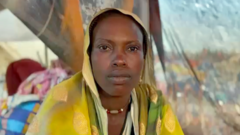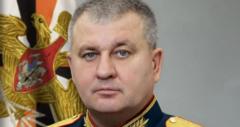The International Criminal Court has issued an arrest warrant for Israeli Prime Minister Benjamin Netanyahu, placing him alongside several other notable leaders, such as Vladimir Putin and Omar al-Bashir, who have also faced charges. While member countries are theoretically obligated to arrest those with active warrants, historical compliance varies significantly.
Netanyahu Joins Ranks of Leaders Charged by International Criminal Court

Netanyahu Joins Ranks of Leaders Charged by International Criminal Court
Prime Minister Benjamin Netanyahu of Israel becomes the latest sitting leader to face arrest warrants from the International Criminal Court, a list that includes Vladimir Putin and Omar al-Bashir.
Article:
On November 21, 2024, Prime Minister Benjamin Netanyahu of Israel was charged by the International Criminal Court (ICC), joining a small group of sitting leaders facing such allegations. This development aligns Netanyahu with figures like Sudan's deposed president Omar Hassan al-Bashir and Russia's current leader Vladimir V. Putin—both of whom are subject to ICC arrest warrants.
The warrant for Netanyahu, announced on Thursday, highlights ongoing tensions in international governance and law enforcement, particularly regarding the enforcement of ICC orders. Under the court's regulations, member states are mandated to apprehend individuals with active warrants. However, this requirement often encounters significant challenges in practice, as various countries have disregarded such obligations in the past.
Vladimir Putin has been under scrutiny since a March 2023 arrest warrant was issued against him due to alleged war crimes during Russia's invasion of Ukraine, notably regarding the forcible deportation of children. Despite this, Putin has continued to travel internationally, receiving warm receptions in nations like China, which is not bound by ICC jurisdiction. His more recent travels included a state visit to Mongolia, an ICC member state.
Omar Hassan al-Bashir's case is similarly complex; the ICC issued warrants for him in 2009 and 2010, charging him with genocide and crimes against humanity stemming from violence in Darfur. Despite these charges, al-Bashir traveled to South Africa for an African Union summit in 2015, managing to evade arrest at that time. The former president was eventually ousted in 2019 after three decades in power and now faces additional charges in Sudan.
Among other historical cases, Colonel Muammar el-Qaddafi of Libya was charged in 2011, shortly before being killed during the civil uprisings against his regime. Conversely, William Ruto of Kenya was charged with crimes against humanity related to post-election violence, though the ICC dropped those charges in 2016, allowing him to be elected president in 2022. Laurent Gbagbo of Ivory Coast was similarly indicted in 2011 but was acquitted by the court in 2021.
These cases illustrate the complicated interplay between international law and political realities, particularly regarding accountability for war crimes and the enforcement of justice at the level of state leaders. As Netanyahu faces these unprecedented charges, the globe watches how this will unfold given the historical context of similar situations with other leaders.
On November 21, 2024, Prime Minister Benjamin Netanyahu of Israel was charged by the International Criminal Court (ICC), joining a small group of sitting leaders facing such allegations. This development aligns Netanyahu with figures like Sudan's deposed president Omar Hassan al-Bashir and Russia's current leader Vladimir V. Putin—both of whom are subject to ICC arrest warrants.
The warrant for Netanyahu, announced on Thursday, highlights ongoing tensions in international governance and law enforcement, particularly regarding the enforcement of ICC orders. Under the court's regulations, member states are mandated to apprehend individuals with active warrants. However, this requirement often encounters significant challenges in practice, as various countries have disregarded such obligations in the past.
Vladimir Putin has been under scrutiny since a March 2023 arrest warrant was issued against him due to alleged war crimes during Russia's invasion of Ukraine, notably regarding the forcible deportation of children. Despite this, Putin has continued to travel internationally, receiving warm receptions in nations like China, which is not bound by ICC jurisdiction. His more recent travels included a state visit to Mongolia, an ICC member state.
Omar Hassan al-Bashir's case is similarly complex; the ICC issued warrants for him in 2009 and 2010, charging him with genocide and crimes against humanity stemming from violence in Darfur. Despite these charges, al-Bashir traveled to South Africa for an African Union summit in 2015, managing to evade arrest at that time. The former president was eventually ousted in 2019 after three decades in power and now faces additional charges in Sudan.
Among other historical cases, Colonel Muammar el-Qaddafi of Libya was charged in 2011, shortly before being killed during the civil uprisings against his regime. Conversely, William Ruto of Kenya was charged with crimes against humanity related to post-election violence, though the ICC dropped those charges in 2016, allowing him to be elected president in 2022. Laurent Gbagbo of Ivory Coast was similarly indicted in 2011 but was acquitted by the court in 2021.
These cases illustrate the complicated interplay between international law and political realities, particularly regarding accountability for war crimes and the enforcement of justice at the level of state leaders. As Netanyahu faces these unprecedented charges, the globe watches how this will unfold given the historical context of similar situations with other leaders.



















